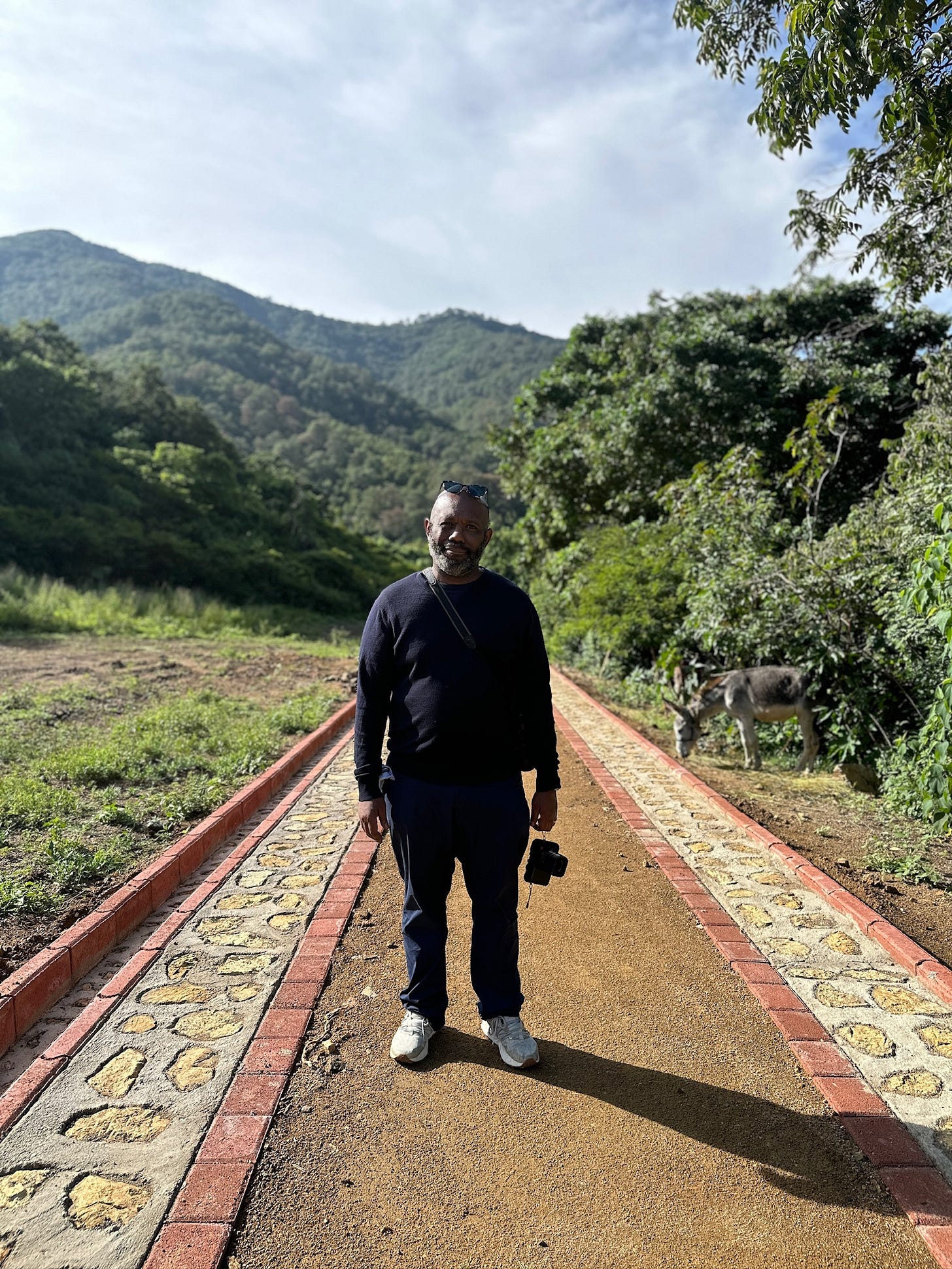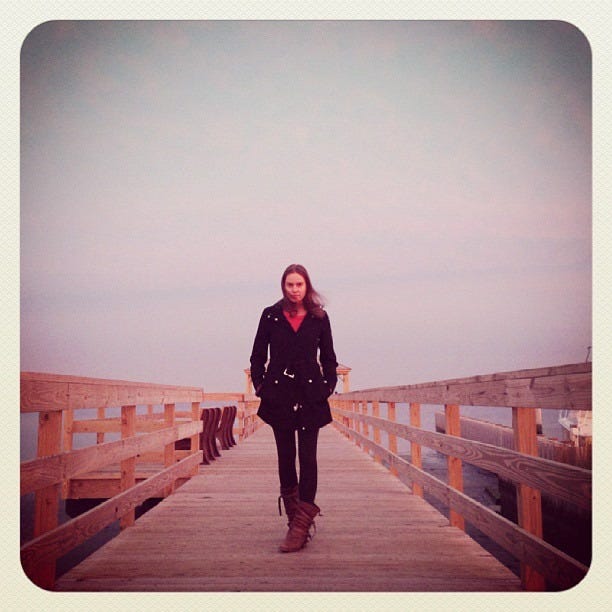When the System Doesn’t Fit: Neurodivergence, Self-Employment, and Finding Your Own Path
Creative entrepreneur Tayyib Smith on how neurodivergence shapes the way we work, thrive, and define success.
I’ve been self-employed since college—over 15 years—and in that time, I’ve worn many hats: pilates instructor, personal chef, fashion label founder, photographer… now website designer and business consultant. But through every pivot, one thing has stayed the same: I keep choosing self-employment.
For a while, I felt guilty—like I couldn’t commit to one thing. But eventually I realized: it’s not a field I’m drawn to, it’s a format. The autonomy. The flexibility. The chance to build a life on my own terms.
I used to joke that I was a professional at not getting a “real” job—but it’s not just a joke. The older I get, the clearer it becomes: self-employment isn’t a quirky preference. It’s a way to set myself up to thrive.
Lately, I’ve been learning more about neurodivergence, and I’m starting to see myself in the growing number of women who’ve quietly gone undiagnosed—sensitive to their environments, masking well, and figuring it out under the radar. I’ve also noticed how often I reverse numbers or mix up left and right—quiet signs that dyslexia might be part of my picture too.
This all clicked in a new way a few years ago, at a dinner party hosted by a client. I was chatting with Tayyib Smith, a Philly-based creative and entrepreneur, when he said something that struck a deep chord. We were talking about dyslexia and neurodivergence, and he casually remarked, “Most people I know who are self-employed are also on the spectrum.” Then he added something that’s echoed in my brain ever since:
“For a lot of us—especially folks who move through the world with differently wired minds—self-employment isn’t just a career path, it’s a form of self-preservation. A way to structure life on your own terms when the so-called ‘standard operating system’ doesn’t quite fit.”
I replayed this concept in my head for years. When I saw Tayyib again a few months ago, I told him how much it had stayed with me—how what he shared has, and still is, helping me ask new questions. How it’s clarified why I find so much meaning in helping my self-employed clients build work lives that honor their whole selves—because self-employment has allowed me to thrive in ways that honor mine. And, I’m passionate about helping others find that kind of freedom for themselves, too.
After our chat, I asked if he’d be open to talking more for All The Bits. He graciously agreed, and we had a conversation about neurodivergence and self-employment, the value of lived experience, and how to stay magnetic to the world you actually want to live in.
A Life Built Differently
Tayyib Smith hasn’t had a “job” since the 1990s. He’s spent his career building things—from working in music and culture, to launching the Institute of Hip-Hop Entrepreneurship, to co-founding Little Giant Creative, a Black-owned creative agency in Philadelphia that blends storytelling, strategy, and justice. His path has been nonlinear, creative, and deeply intentional. But it didn’t always feel that way.
Growing up with dyslexia, Tayyib encountered school systems that didn’t know what to do with a mind like his. “You have an indoctrination from an antiquated curriculum that doesn’t support how many of us actually think,” he said. “I was labeled and treated like I didn’t have value in the classroom. But those same systems didn’t know what to do with someone like me, who could see patterns and think laterally.” The system wasn't built for kids who processed differently—or for kids like him, with a name that corporate America didn’t want to pronounce. “I didn’t have the academic pedigree. I had a name that wasn’t palatable to white HR departments. I understood early on that no one was going to hand me a traditional opportunity.”
Tayyib credits his mother for recognizing this early and encouraging him to blaze his own untraditional path. She saw the writing on the wall: the school system wasn’t built for kids like him, and traditional career paths were unlikely to open their doors. So she guided him toward entrepreneurship—not as a creative luxury, but as a form of survival. And in hindsight, he realizes just how right she was. Self-employment gave him room to build a life around his strengths rather than constantly suppressing them. It created a container where his creative power and nonlinear thinking could flourish instead of being squeezed into someone else's mold.
After high school, Tayyib served in the military, which offered both structure and disillusionment. When he returned, he enrolled at Temple University (also my alma mater) for a few semesters. It was there—in those academic spaces—that he had a realization: many of the people leading the classroom had far less real-world experience than he did. “It hit me that I knew more than some tenured professors,” he said—not with arrogance, but with clarity. He saw how academia could function as an echo chamber, recycling ideas among people who had followed similar paths and rarely stepped outside them.
That struck a chord for me. Back in college, I was nudged toward the PhD track. I was curious—but the idea of spending more years tied to a computer felt like a kind of energetic death sentence. I remember thinking: if I ever teach, I want it to be because I’ve actually done something in the real world first—something that gives me more to offer students than just theory.
One of my professors once said, “There are two ways to end up teaching at a university: you either get your PhD, or you become so successful in your field that they invite you to come speak.” The second path felt more alive to me, and I loved seeing how Tayyib had also chosen that path and is living proof of it. He’s a model of what it looks like to build mastery through doing, not credentialing—and to return to the academic conversation with something worth saying.
Neurodivergence as Strategic Asset in Adulthood
Flash forward, and Tayyib has found his stride leading life as a self-employed individual. But his understanding of neurodivergence continues to evolve—and deepen. One moment that shifted his perspective came through a podcast he shared with me called The Codpast, specifically episode 35 which explores life through the lens of dyslexia. In one episode, British intelligence agency GCHQ revealed that it actively recruits people with dyslexia and dyspraxia—not despite their differences, but because of them.
These individuals often possess what are known as “spiky skills”—they might struggle with reading or spelling, but excel in pattern recognition, big-picture thinking, spatial reasoning, and lateral problem-solving. In fields like codebreaking and cybersecurity, these aren’t soft skills—they’re mission-critical.
GCHQ didn’t just recognize this—they built systems around it. They adapted their recruitment processes and workplace environments to support these unique minds. They stopped pathologizing difference and started designing for it. Imagine if more institutions did the same. Imagine if the value of neurodivergent thinking wasn’t something we had to prove—but something we planned for from the start.
Ripple Effects & New Norms
This conversation with Tayyib is part of a broader cultural shift that’s beginning to ripple across creative and entrepreneurial circles—and into more mainstream spaces too. More people are exploring late-in-life diagnoses or quietly identifying with terms like ADHD, dyslexia, or “on the spectrum”—not as labels, but as a way to name a lifelong sense of not quite fitting.
“It’s not new,” Tayyib said, “but we’re finally talking about it.”
And with that talking comes something else: agency. Permission to ask what kind of work environment actually supports your brain. To question the default mode. To say no to grind culture, rigid schedules, or open-plan offices if they don’t serve you.
Tayyib also pointed out a generational shift. “I’ve noticed that some younger folks we hire tend to wait for instructions, rather than taking initiative,” he said. It wasn’t a critique—just an observation. In a world of structured education and algorithm-driven decision-making, initiative can get trained out of people. But for self-employment—and really, for any creative life—you need to move before you feel ready. You have to practice trusting yourself. No syllabus. No rubric. Just real life.
Crafting a Sustainable Life
For many of us, self-employment isn’t just a workaround—it’s a better system. One that accommodates cycles of rest and intensity. One that makes space for intuition and collaboration. One that actually fits the way our brains work.
Tayyib’s approach reflects that. “I like partnership more than employee,” he told me. His teams are interdisciplinary, values-aligned, and built on trust—not rigid hierarchies. “If you can build trust between people who think differently, who have different strengths—that’s where the magic happens.”
We also talked about the importance of mentorship—not the performative kind, but the kind rooted in shared experience. “Attach yourself to someone who’s doing what you want to do,” he said. “Be magnetic to the space you desire.” That idea stuck with me. Because this isn’t just about career advice. It’s about belonging. Finding people who see the world like you do—or who are at least willing to.
Of course, self-employment comes with its own risks. Tayyib was candid about that too. He encourages anyone considering it to save up three to twelve months of living expenses, if possible. “It gives you the freedom to make values-based decisions instead of fear-based ones.” That kind of financial buffer isn’t always easy—but it’s part of building something truly sustainable.
And sustainability matters more than ever. We’re living in a moment where large institutions hold more power than ever, and independent labor is often devalued. The old playbook—get a degree, get a job, stay loyal—isn’t built for the world we’re in. So we need new models. Ones that honor lived experience, creative intelligence, and neurodivergent minds.
A New Blueprint
This conversation didn’t hand me a perfect answer—but it helped me see something more clearly: that building a work life around your brain, your energy, and your values isn’t self-indulgent. It’s strategic. It’s sustainable. And for many of us, it’s essential.
Self-employment is often framed as risky. But what if the real risk is staying in systems that were never built with everybody in mind?
I’d love to hear from you: What’s been your experience with neurodivergence and work? Are you building your own path—or dreaming of it? DMs and comments welcome.
With care and creative fire,
Avi
P.S. Where to Find Tayyib:
Tayyib Smith is a principal at Smith & Roller, and Chief Strategist at The Growth Collective a Philly-based agency focused on culture, design, and social impact. You can also read his recent op-ed in the Philadelphia Inquirer: America at 250: What memories will we carry forward? & at Next City The Vanguard We Need: Why Philadelphia Must Back Black Brilliance with More Than Rhetoric
P.P.S. Join All The Bits
If this piece spoke to you, consider becoming a free or paid subscriber to All The Bits to support this little corner of the internet where I’m exploring self-employment, self-care, creativity and spirituality:




